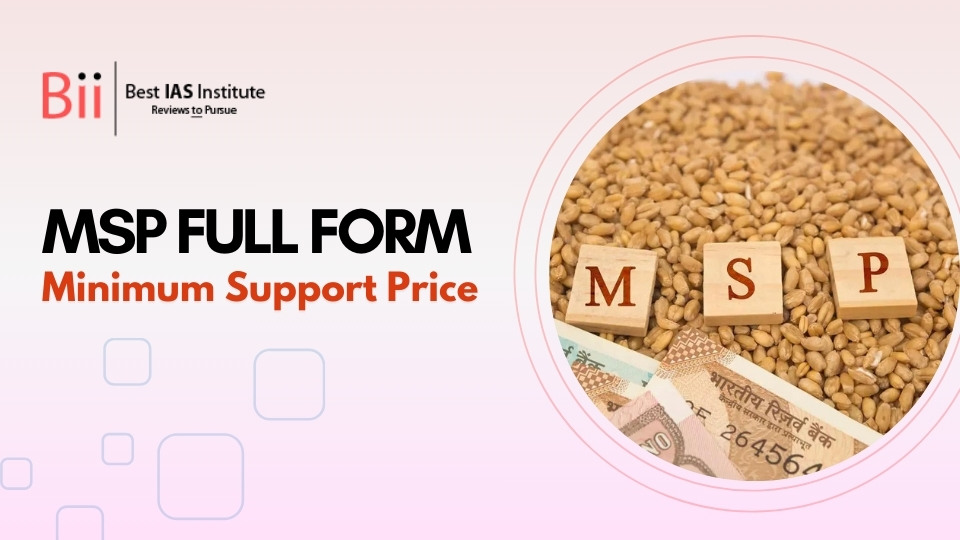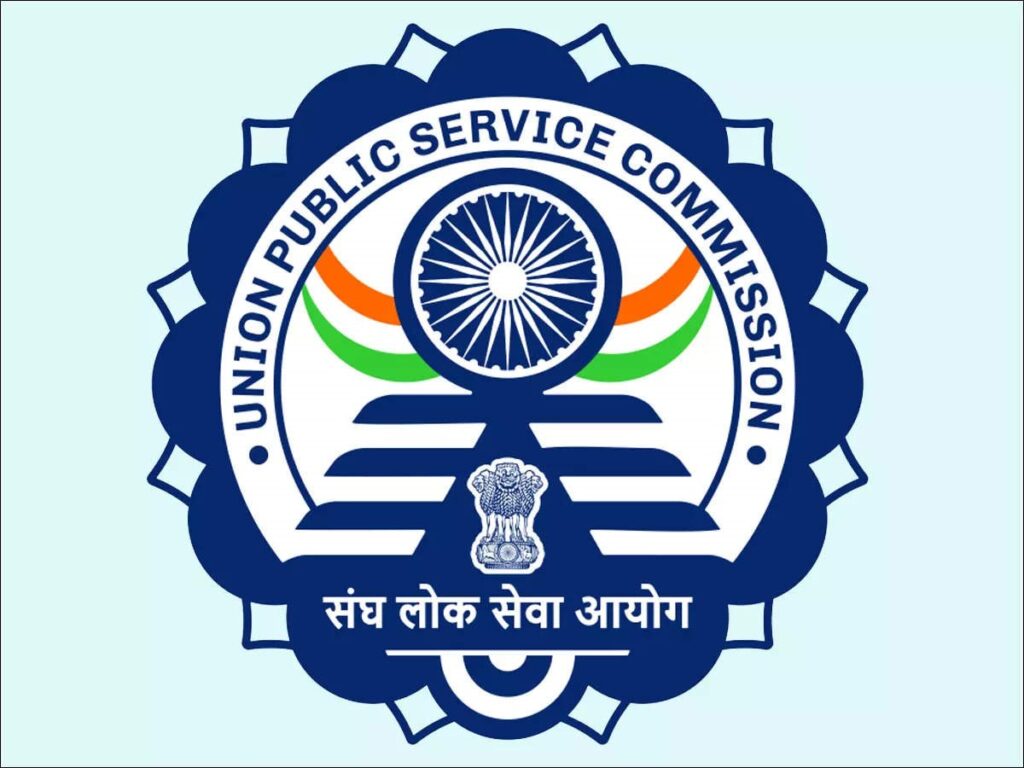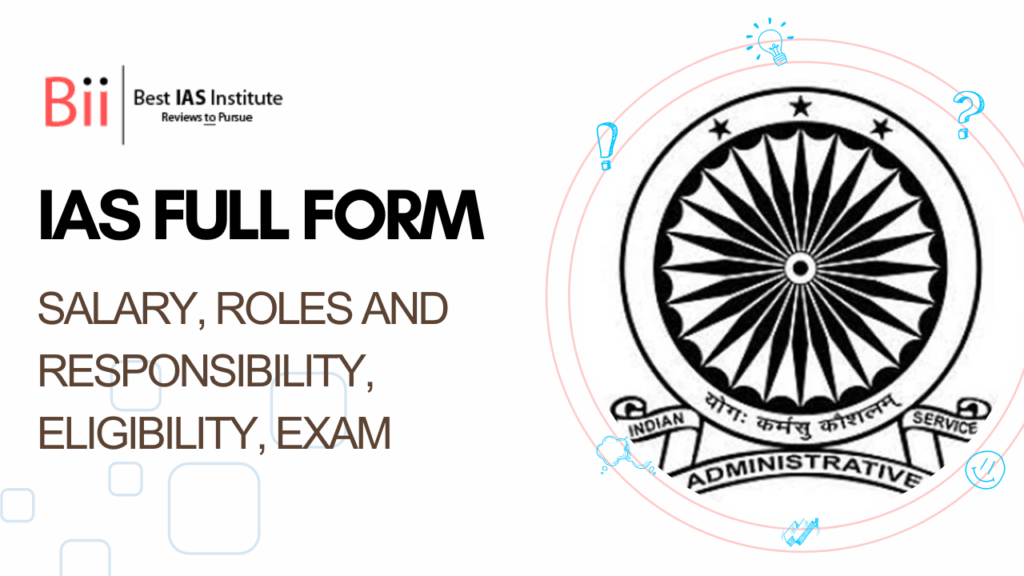
MSP stands for Minimum Support Price. It is the policy of the Government of India to give fixed prices of crops to the farmers. This price acts as a safety net to ensure that farmers get a reasonable return on their produce even when market prices fall. MSP aims to create a stable agricultural market by supporting the livelihood of farmers.
| MSP Full Form Overview | |
| MSP Full Form | Minimum Support Price |
| MSP Full Form in Hindi | न्यूनतम समर्थन मूल्य |
| Aim | Ensure farmers receive a stable price, protect from market fluctuations. |
Features of Minimum Support Price
There are certain Minimum Support Price (MSP) factors.
- Pricing: MSP ensures that farmers get the lowest possible price for their produce and protects them from market fluctuations.
- Crops: Wheat, rice, pulses, oilseeds, cotton, sugarcane and other crops are grown.
- Government procurement: Government agencies procure goods from farmers or areas identified by MSPs.
- Market Stability: MSP contributes to market stability by setting small prices and preventing large price swings.
- Income: Provides income for farmers Livelihood, especially for important crops.
- Policy adjustments: MSP payments are adjusted from time to time based on factors such as production, market developments and inflation.
Significance of MSP
- Fair value: MSP allows farmers to price their products at the lowest possible price, ensuring that their efforts and investments are adequately compensated.
- Market Stability: By providing reference prices, offshore locations encourage market stability and reduce the potential for significant price swings. It hurts the farmers. and that of consumers
- Food Security: MSP encourages farmers to grow staple crops such as wheat, rice and maize, which are essential for food security. This keeps these products in the market.
- Supporting the rural economy: Increased farm income increases rural expenditure, strengthens local economies and supports non-farm livelihoods.
- Reduce risk: Farmers have less risk because MSPs standardize their protection. Market prices are reduced, allowing better planning and investment in agricultural activities.
- Social equity: MSP promotes social justice by providing a safety net that empowers small and marginal farmers who are often exposed to markets.
- Government objectives: The MSP reflects the government’s commitment to emphasize their role in sustainable and prosperous agriculture because they are farmers and agriculture.
Minimum Support Price Issues
- Distorted market: MSPs can create distorted market dynamics by increasing the price of produce and creating an imbalance between supply and demand.
- Limited resources: MSPs basically help farmers grow a selection of crops, such as wheat and rice, to the exclusion of others. in many others. crops and farmers who may face price fluctuations.
- Procurement challenges: Government programs to procure MSP crops often face logistical problems, resulting in delays and inefficiencies in payments to farmers
- Storage and distribution: Overproduction under MSP can be difficult to manage and, if not properly managed, can lead to storage and waste management problems.
- Economic constraints: Preserving ocean space for abundant crops burdens public finances, increases sustainability, and requires allocation of resources.
- Market distortion: MSP policies can distort market signals and prevent profitable or sustainable creation. Get crops and technology.
- Disproportionate advantage: Larger farmers or those with good markets tend to benefit more from offshore locations, while smaller, more remote farmers do not benefit at all.
Minimum Support Price Policy
The Minimum Support Price (MSP) is an initiative of the Government of India to provide farmers with minimum prices for their produce and in the MSP the government provides minimum prices for certain agricultural commodities such as wheat, rice and maize and the farmers can sell their produce to government agencies or designated buying centers at prices that act as a safety net against market fluctuations and the marine space program aims to generate income for farmers, encourage the production of essential agricultural products and stabilize market prices. MSP is an integral part of India’s agricultural support system, which aims to protect the welfare of farmers and ensure the country’s food security. The government prepares adjustments to Minimum Support Price ( MSP) from time to time to maintain their efficiency and profitability based on factors such as production, demand and supply and inflation.
Determinants of MSP
The Minimum Support Price (MSP) is determined by several factors:
- Production costs: Includes costs such as seed, fertiliser, labour and machinery costs.
- Market price: The current market price of the same crop.
- demand for supplies. Dynamics: crop availability and market demand.
- Inflation: The effect of inflation on production and selling prices.
- Value: The cost of utilities such as gasoline, electricity, and irrigation water.
- Government policies: Agricultural policies and infrastructure affect yields.
- International Prices: Global markets affect the domestic prices of export crops.
Minimum Support Price Crops List
The Minimum Support Price (MSP) applies to many crops in India. The main trees covered by the MSP are:
- Wheat: This is the staple crop of all India.
- Rice: Another staple crop.
- Pulses: Vegetables like chutney, lentils and beans are available.
- Oil seeds: It’s like mustard, soybean and sunflower seeds.
- Cotton : It is important in the textile industry.
- Sugarcane: Used to make sugar.
- Jute: Important in the jute industry.
- Corn: Cultivated in some areas for food and feed.
- Titco: For food,and technical purposes.
- Mill: Grains such as pearl millet, sorghum, and finger millet.
Benefits of Minimum Support Price
- Income Stability: Farmers receive a guaranteed minimum price for their crops, providing them with a stable income.
- Market Position: Protects farmers from sudden drop in market prices and reduces financial risks.
- Features Development Assistance: This helps the livelihood of farmers, especially in the case of important crops.
- Food Security: Ensures continuous supply of food that contributes to national food security.
- Strengthens Rural Economy: Promotes rural economy by increasing their purchasing power. farmers and local costs.
- Risk Reduction: Reduces risks related to market fluctuations and promotes agricultural production.
MSP Full Form in Other Various Field
| Field | Other MSP Full Form |
| Agriculture | Minimum Support Price |
| Healthcare | Managed Service Provider |
| Information Tech | Microsoft Partner |
| Economics | Marginal Standing Facility |
| Finance | Monetary Service Provider |
| Education | Multi Sensory Program |
| Military | Military Sealift Command |
| Environment | Minimum Streamflow Protection |
| Politics | Member of Scottish Parliament |
| Science | Magnetic Stimulation Therapy |
Conclusion
The MSP full form is Minimum Support Price and it supports farmers and ensures food security. MSP ensures stable income for farmers and protects them from market instability. Not only does MSP support rural livelihoods, but it also contributes to economic growth by keeping market prices stable and increasing agricultural output. However, MSP implementation and effectiveness needs to be kept under constant review and adjustment based on factors like production, market conditions and farmer well-being. MSP is an important instrument for sustainable and resilient farming in India.
Also Read:
OECD Full Form
ED Full Form
CSIR Full Form
UPSC Full Form
NET Full Form
NITI Full Form
UCC Full Form
IC Full Form
PIL Full Form
IES Full form



